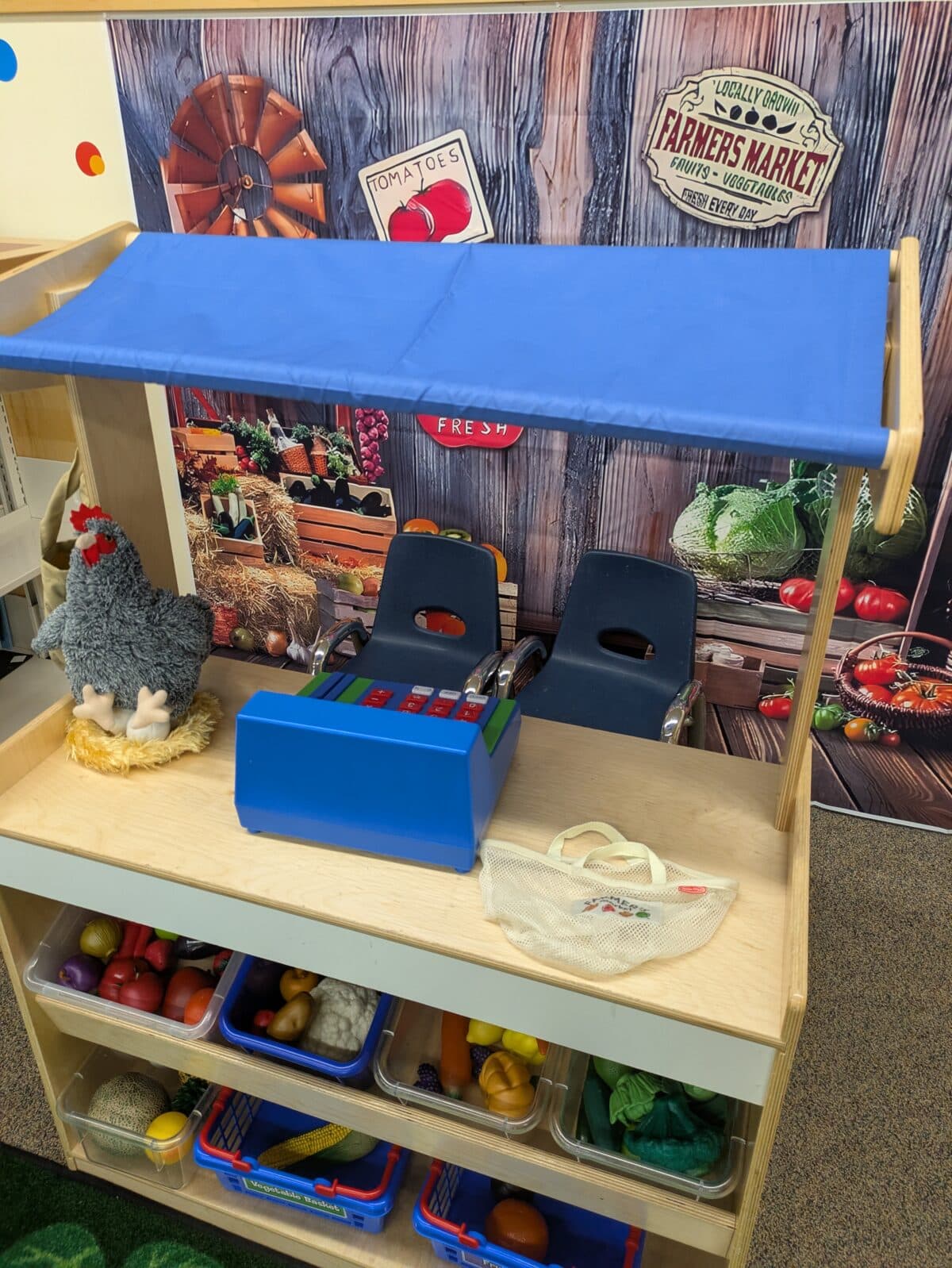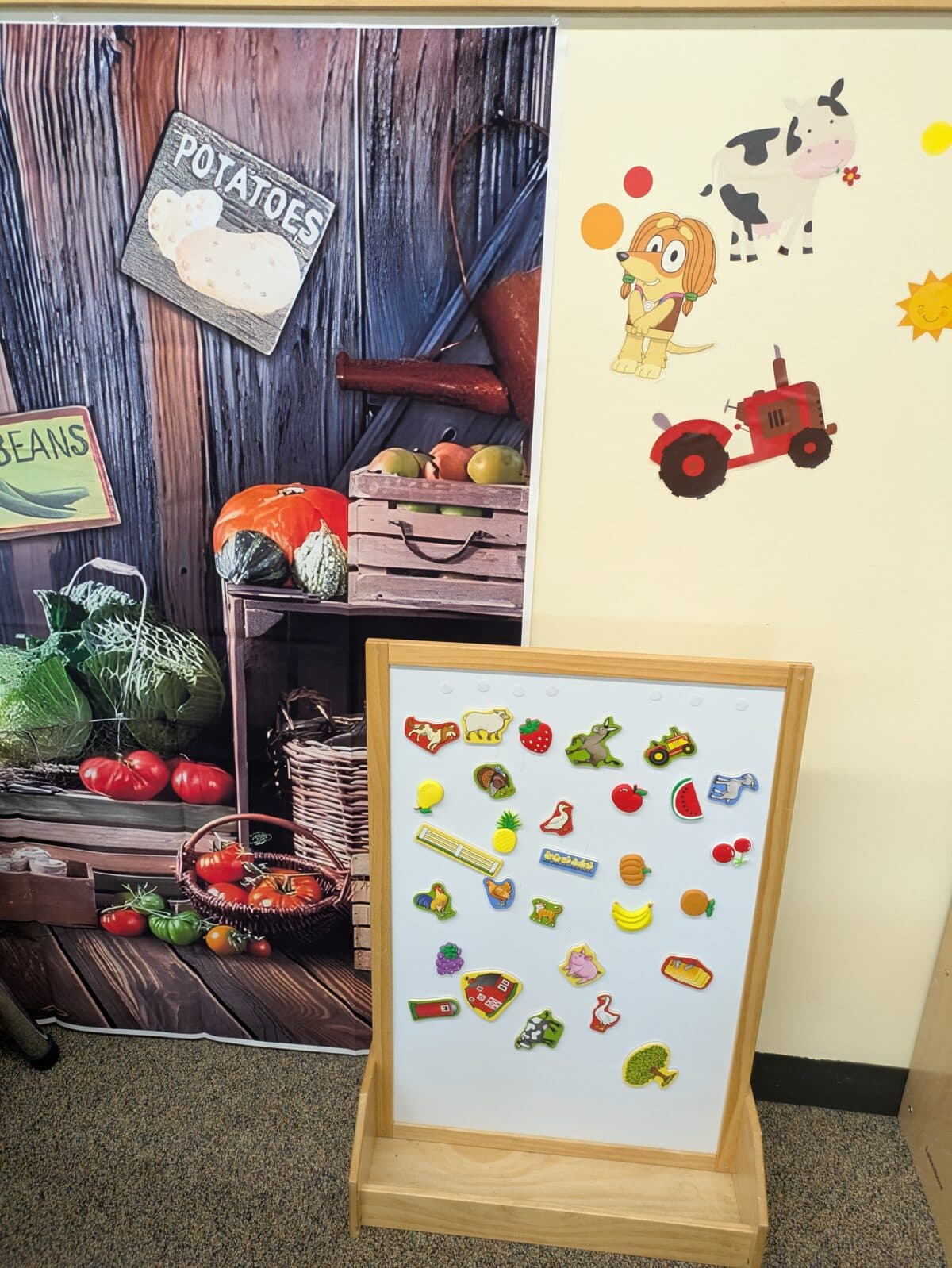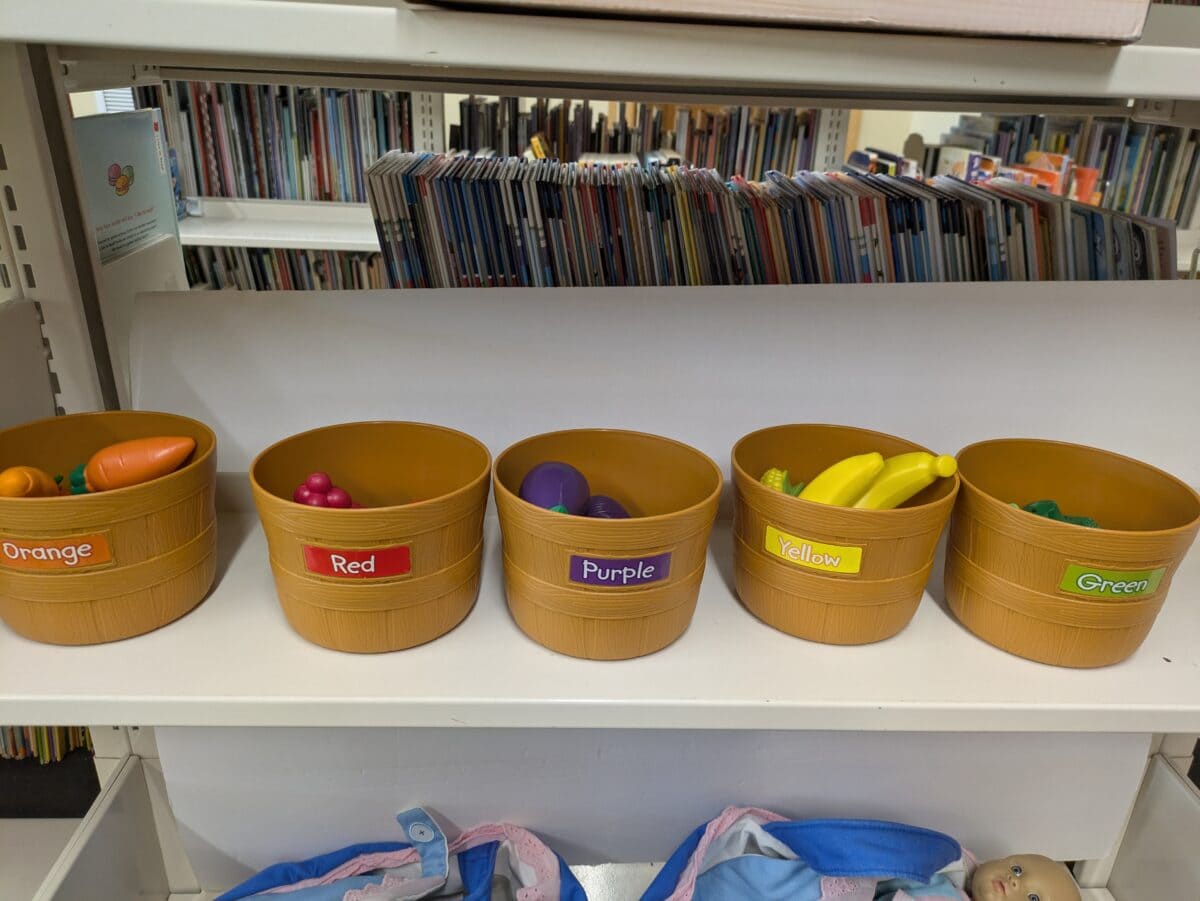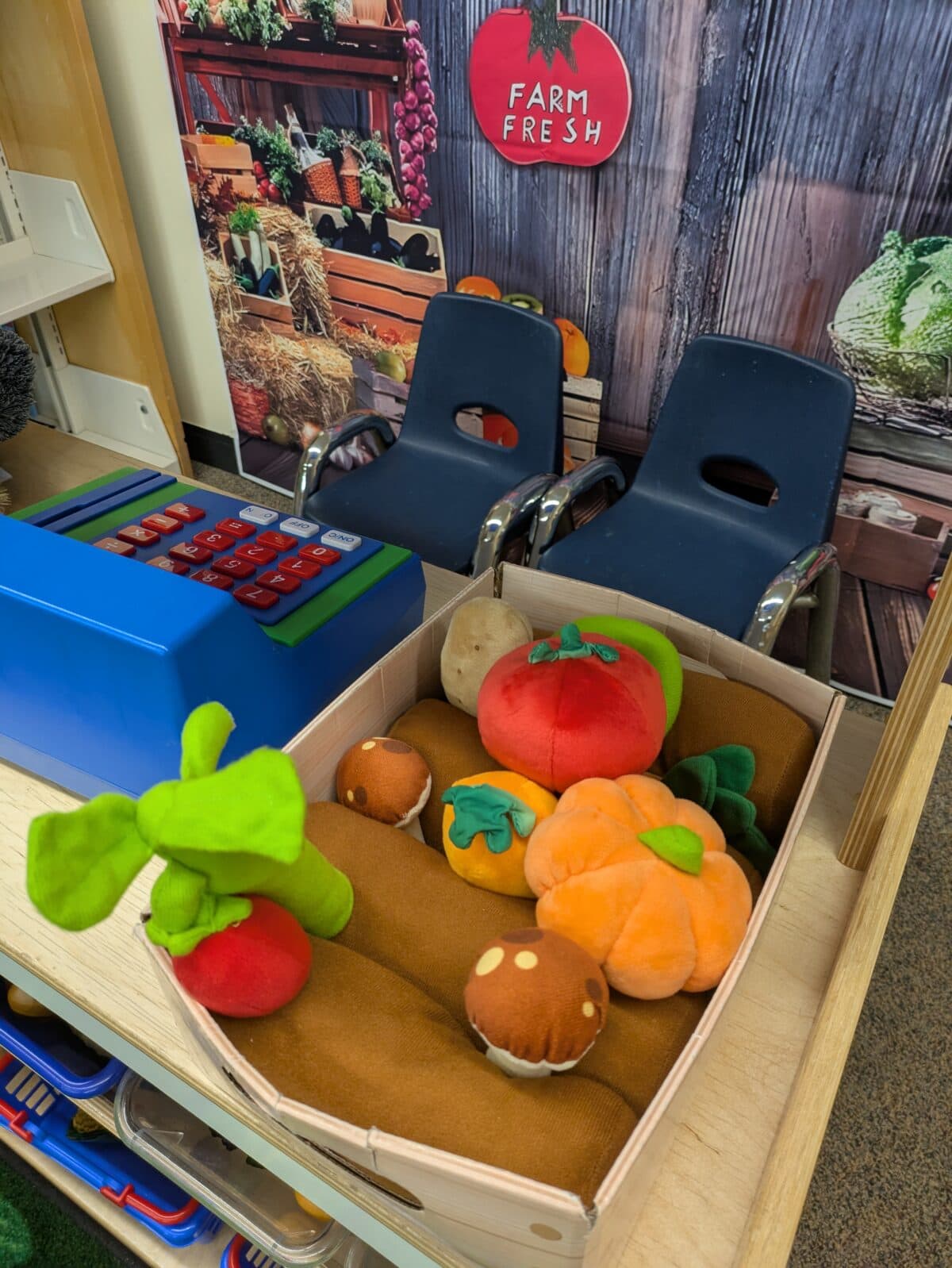



Our current theme is “Farmers Market!” Pretend to sell fruits and veggies at the farm stand, sort produce by color, play with the barn and farm animals, and plant a pretend garden!
In July 2020, the library was awarded a federal LSTA grant to provide the Children’s Room with a new Play Space and programming based on SEL (Social Emotional Learning) concepts. Due to COVID restrictions, we were unable to move forward with our plans until June 2021.
The Children’s Room has been rearranged with the new space in mind. Almost everything is new! Some toys and furniture will remain in the space all the time, while others may be rotated out or changed up with a new themed installation to keep things fresh and exciting.
Visit our Play Space and let us know what you think!

The Charlton Library Play Space was developed with federal funding from a Mind In the Making Grant awarded to the CharltonPublic Library from the Institute of Museum and Library Services and administered by the Massachusetts Board of Library Commissioners.
LSTA Mind in the Making Grant
Background Information
From the MBLC Mind in the Making Fact Sheet
“Since 2012 the Institute of Museum and Library Services (IMLS) has invested over 8.5 million dollars in projects supporting early learning. In a recent publication Growing Young Minds, IMLS highlighted how libraries and museums can support the development of executive function and “deeper learning skills” through literacy and hands on-experiences. These practices help address the important social, emotional and cognitive aspects of learning and foster persistence, self-direction, critical thinking and problem solving.
Ellen Galinsky, President and Co-Founder of the Families and Work Institute whose book Mind in the Making has grouped research into 7 critical areas that children need most. These executive function life skills include: focus and self-control, perspective taking, communicating, making connections, critical thinking, taking on challenges and self-directed, engaged learning. Library programs that provide play and inquiry-based programs can demonstrate how to create new and innovative ways to promote these skills through family engagement and by working with community partners such as local preschools, Head Start and youth organizations.
It has been observed that tinkering is critical to children’s motor skills as they learn to use their hands to shape, move, and manipulate objects. Tinkering activities can also build peer relationships among children by encouraging collaboration as they work on projects together. They may provide opportunities to strengthen family relationships when children and caregivers are learning together.
Taking note of information about ‘deeper learning skills’, the Massachusetts Department of Early Education and Care has developed Pre-School and Kindergarten Standards in the Domains of SocialEmotional Development and Approaches to Play and Learning. Expanding opportunities for young children to participate in creative play activities in the library as well as to build, problem solve, think critically and even embrace failure will result in their becoming more confident and engaged learners.”
The Benefits of Play
Information on this page was taken from Pathways.org, a non-profit organization. Visit their site for more tools and information on child development @ pathways.org
Play is Important
Giving a child the opportunity, time, and space to play helps to foster many important life skills. Engaging in play allows a child to explore different interests, passions, and talents. Play is a wonderful educational tool that helps prepare them for life experiences.
Play Builds Skills for a Lifetime
- Knowing what to do when no one is directing you
- Problem solving
- Creativity and imagination
- Interacting with others and negotiating
- Resilience
- Flexibility and adaptability
- Willingness to take risks and try different scenarios
- Processing emotions
- Understanding social situations
- Discovering interests
Parents and Caregivers Are Important Play Role Models
Caregivers, especially parents, are a child’s first and best teacher. The way parents act with their infants and toddlers can impact them for the rest of their lives. Playing together is an important way for parents to build strong relationships with their children.
Use Play to Help Meet Milestones
0-6 Months
- Show baby interesting objects such as a brightly colored mobile or toy
- Talk to baby often to familiarize baby with your voice, respond when they coo and babble
- Place baby in different positions so they can see the world from different angles
- Let baby bring objects to mouth to explore and experience new textures
- Vary facial expressions and gestures so baby has the opportunity to imitate them
- Use a mirror or favorite toy to help your baby engage in and enjoy Tummy Time
7-12 Months
- Play peek-a-boo
- Use a mirror to show faces to baby
- Provide baby with a safe environment to crawl and explore
- Place baby in a variety of positions such as on tummy, side, etc.
- Give baby opportunities to learn actions have effects, e.g. when they drop a toy and it falls to the ground
- Expose baby to a variety of age appropriate toys, e.g. balls, shape sorters, music toys, or common household items like pots and spoons
1-3 Years
- Allow child to spend time with objects and toys they enjoy
- Give child crayons or markers to so they can practice scribbling
- Encourage child to interact with peers
- Help child explore their body through different movements, e.g walking, jumping, and standing on one leg
- Provide opportunities to create make-believe situations with objects, e.g. pretending to drink out of empty cup
- Respond when child speaks, answer questions, and provide verbal encouragement
4-6 Years
- Provide opportunities for child to sing, dance, and try a variety of movements, e.g. hopping, swinging, climbing, and doing somersaults
- Tell stories to child and ask them questions about what they remember
- Give child time and space to act out imaginary scenes, roles, and activities
- Allow child to move between make-believe games and reality e.g. playing house and helping you with chores
- Schedule time for child to interact with friends to practice socializing and building friendships
Tips To Make The Most of Play Time
- Limit screen time
- Promote outdoor play
- Allow for child to make mistakes
- Give child free time to play outside of school organized activities
- Let child make choices about games, activities, and toys
- Encourage use of imagination
- Offer new challenges if child is bored or help if child is frustrated
- Provide encouragement and support
